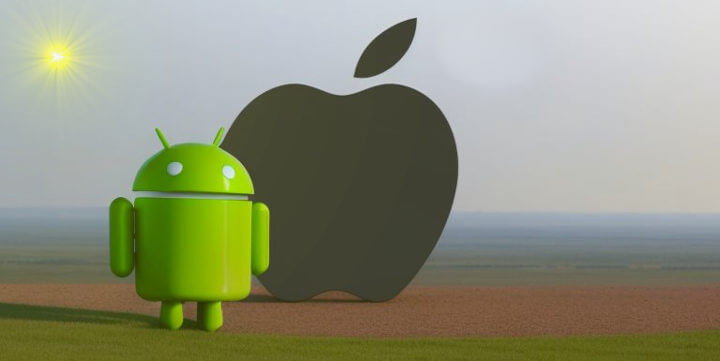
The following dialogue is a conversation between Alex, who is advocating for Samsung with Android, and Leo, who is defending Apple with iOS. Alex argues that Samsung offers various models and price ranges, making it more accessible for different budget types. Leo counters that Apple provides a seamless user experience across all devices with their unified ecosystem. Alex acknowledges this but highlights Android's customization options and the freedom to personalize Samsung devices. Leo emphasizes Apple's focus on security, while Alex mentions Samsung's comprehensive security platform. Leo mentions Apple's app optimization, but Alex points out Android's wider range of app choices and innovation. Leo praises Apple's customer service, but Alex mentions Samsung's support network and expandable storage. Both agree that it ultimately comes down to individual preferences and appreciate the innovation and competition between the two companies.
Alex: Hey there! I noticed you're an Apple enthusiast. Can I share a few points on why Samsung with Android is a great alternative?
Leo: Sure, but I have some solid reasons why iOS is superior. Go ahead and make your case.
Alex: Well, first off, Samsung devices come in various models and price ranges. This provides options for all budget types. Not everyone can afford high-end iPhones, and Samsung's range ensures accessibility for everyone.
Leo: That may be true, but Apple offers a seamless user experience across all their devices. With iOS, you have a unified ecosystem where data, apps, and devices integrate flawlessly. It's a seamless journey from iPhone to iPad to MacBook, don't you appreciate that?
Alex: No doubt, Apple provides a cohesive ecosystem. However, Android offers a broader range of customization. Samsung users have the freedom to personalize their devices, change themes, explore various launchers, and even modify the system's layout. Android caters to individual preferences like no other.
Leo: While customization is great, Apple's focus on security sets them apart. iOS is known for its stringent security measures, keeping user data safe from malware and hacking attempts. It's a peace of mind we Apple users value immensely.
Alex: You bring up a valid point about Apple's security, but on the flip side, Android has made significant progress in this department. Samsung employs Samsung Knox, a comprehensive security platform that protects user data and prevents unauthorized access. They constantly update and evolve their security protocols.
Leo: True, but another area where Apple shines is app optimization. Developers prioritize iOS when it comes to app releases, resulting in smoother experiences and timely updates. It's hard to deny that many apps still work better on iPhones compared to Android devices.
Alex: I agree, Apple's app optimization is commendable, but Android offers a wider range of app choices through Google Play Store. Additionally, Android's open-source nature encourages innovation, leading to apps that cater to niche markets, expanding the possibilities for users.
Leo: I understand your point, but Apple's customer service is unbeatable. Their Apple Stores worldwide provide unrivaled support, coupled with a reliable warranty system. The ease of getting assistance and quick resolution for any issues is a major advantage.
Alex: Yes, Apple's customer service is really impressive, but Samsung isn't lagging behind either. They have an extensive support network, including authorized service centers worldwide, ensuring customers receive prompt help. Moreover, the expandable storage option in Samsung devices gives users flexibility without relying solely on cloud storage.
Leo: Fair enough, both sides have their merits. It ultimately comes down to individual preferences and priorities. Some value customization, affordability, and variety, favoring Samsung with Android. Others prioritize seamless integration, security, and optimized experiences, going for Apple with iOS. In the end, it's about what suits our needs best.
Alex: Absolutely, at the end of the day, both Samsung and Apple offer unique experiences to their users. It's great that we have different choices catering to diverse preferences. So let's agree to disagree but appreciate the innovation and competition driving both companies forward!
Questions to the Dialogue
- What are some specific customization options that Samsung devices with Android offer?
- Can you provide examples of how Apple's unified ecosystem enhances user experience?
- How does Samsung ensure the security of user data with Samsung Knox?
- In terms of app optimization, can you give specific examples of apps that work better on iPhones compared to Android devices?
- What are some niche market apps that are exclusive to Android due to its open-source nature?
- Could you elaborate on the specific advantages of Apple's customer service and warranty system?
- How does expandable storage in Samsung devices provide flexibility for users?
- Can you both elaborate on any other unique features or innovations offered by Samsung with Android and Apple with iOS, respectively?
- Have either of you personally used devices from both manufacturers to make fair comparisons?
- Ultimately, what factors do you believe are the most important to consider when deciding between Samsung with Android and Apple with iOS?